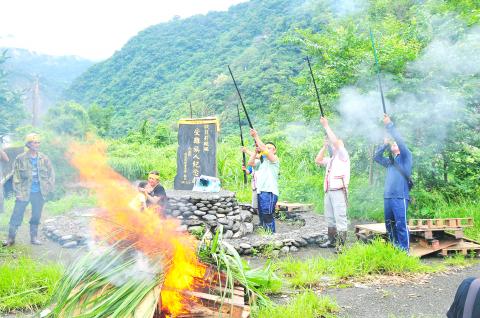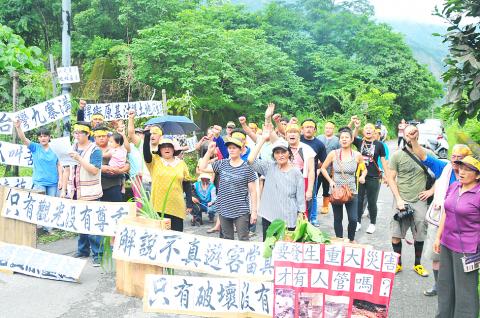Residents of the Truku Aboriginal village of Mukumuqi, a popular tourist attraction in Hualien County because of its natural scenery, yesterday blocked the only road leading to the village in protest against crowds of tourists who the villagers said harm residents’ quality of life and the environment.
Holding up banners reading: “There is only destruction, not ecology,” “There is tourism, but no respect” and “We are not Jiuzhaigou [九寨溝] of Hualien” — referring to a comparison that some tour operators make between the Mukumuqi Gorges and a tourist destination also known for its natural scenery in China — residents stopped minibuses full of tourists at the entrance to the village yesterday.
Prior to blocking the road, the residents performed a ritual at a monument erected in remembrance of 39 villagers who were buried by mudslides triggered by Typhoon Ofelia in 1990 by firing gunshots into the air and sending up smoke signals, declaring to their ancestral spirits their determination to defend their traditional territory.

Photo: Hua Meng-ching, Taipei Times
“It’s not that we do not welcome visitors, but since our village has been opened to outside visitors in 2006, there have been on average more than 100 minibuses bringing in about 3,000 visitors per day on holidays,” village council chairman Masaw said.
“The large number of vehicles has polluted the air, creates traffic jams on the roads and makes it difficult for us to go to work in the fields,” he added.
Rakaw Didi, a spokesman for the village, which is administratively known as Tongmen Village (銅門), said that to maintain the village’s ecology and quality of life, the village council passed resolutions at the end of last month to close off the village for a year and to ask future visitors to enter into the village on foot, not in cars.

Photo: Hua Meng-ching, Taipei Times
“Masses of tourists have caused too much damage to the environment in our village, so we would like to ask the police to stop issuing entry permits for a year, so that the ecosystem can recover,” Rakaw said.
“After a year, we would also like to ask tourists to visit on foot, not in cars,” Rakaw said.
Rakaw added that the resolutions have been forwarded to the township office.
In addition, Rakaw said that tourism has not only damaged the environment, but has also caused misunderstandings about the tribe’s history and culture.
“Most of the tour guides are from outside [the village]. They do not understand our history and culture, and do not study our history and culture, so they often dish out misinformation to tourists,” he said.
“Some tour agencies gave Mukumuqi the title ‘Jiuzhaigou of Hualien,’ but we do not want to be compared to the tourist destination in China. We are Mukumuqi,” he said.
Some tourists decided to cancel their trips after running into the protest, while others agreed to get off their buses and go into the village on foot.
Responding to the call by the villagers, Jian Police Precinct deputy chief Wen Chun-ming (溫俊明) said police are not authorized to turn down legal applications for entry permits.
Yesterday’s protest was the villagers’ latest move to protect their traditional territory, following a successful action at the end of last year and early this year to stop the Forestry Bureau from unilaterally deciding to cut down trees in the village and shipping them out.

Right-wing political scientist Laura Fernandez on Sunday won Costa Rica’s presidential election by a landslide, after promising to crack down on rising violence linked to the cocaine trade. Fernandez’s nearest rival, economist Alvaro Ramos, conceded defeat as results showed the ruling party far exceeding the threshold of 40 percent needed to avoid a runoff. With 94 percent of polling stations counted, the political heir of outgoing Costa Rican President Rodrigo Chaves had captured 48.3 percent of the vote compared with Ramos’ 33.4 percent, the Supreme Electoral Tribunal said. As soon as the first results were announced, members of Fernandez’s Sovereign People’s Party

MORE RESPONSIBILITY: Draftees would be expected to fight alongside professional soldiers, likely requiring the transformation of some training brigades into combat units The armed forces are to start incorporating new conscripts into combined arms brigades this year to enhance combat readiness, the Executive Yuan’s latest policy report said. The new policy would affect Taiwanese men entering the military for their compulsory service, which was extended to one year under reforms by then-president Tsai Ing-wen (蔡英文) in 2022. The conscripts would be trained to operate machine guns, uncrewed aerial vehicles, anti-tank guided missile launchers and Stinger air defense systems, the report said, adding that the basic training would be lengthened to eight weeks. After basic training, conscripts would be sorted into infantry battalions that would take

GROWING AMBITIONS: The scale and tempo of the operations show that the Strait has become the core theater for China to expand its security interests, the report said Chinese military aircraft incursions around Taiwan have surged nearly 15-fold over the past five years, according to a report released yesterday by the Democratic Progressive Party’s (DPP) Department of China Affairs. Sorties in the Taiwan Strait were previously irregular, totaling 380 in 2020, but have since evolved into routine operations, the report showed. “This demonstrates that the Taiwan Strait has become both the starting point and testing ground for Beijing’s expansionist ambitions,” it said. Driven by military expansionism, China is systematically pursuing actions aimed at altering the regional “status quo,” the department said, adding that Taiwan represents the most critical link in China’s

EMERGING FIELDS: The Chinese president said that the two countries would explore cooperation in green technology, the digital economy and artificial intelligence Chinese President Xi Jinping (習近平) yesterday called for an “equal and orderly multipolar world” in the face of “unilateral bullying,” in an apparent jab at the US. Xi was speaking during talks in Beijing with Uruguayan President Yamandu Orsi, the first South American leader to visit China since US special forces captured then-Venezuelan president Nicolas Maduro last month — an operation that Beijing condemned as a violation of sovereignty. Orsi follows a slew of leaders to have visited China seeking to boost ties with the world’s second-largest economy to hedge against US President Donald Trump’s increasingly unpredictable administration. “The international situation is fraught